考研备考英语时文阅读Burnished
备战2022届高考英语外刊时文热点阅读理解 每日阅读1-12 冻卵(解析版)

n.手术(医学术语)
拓展:
相比较于operation、surgery,procedure更专业。
10.time-consuming
英[ˈtaɪm kənsjuːmɪŋ]美[ˈtaɪm kənsuːmɪŋ]
adj.耗费时间的
拓展:
energy-consuming
耗费精力的
money-consuming
n.麻醉剂
a local anesthetic
局部麻醉
a general anesthetic
全麻
13.under sedation
处于镇静状态
14.something comes with low odds
某事的成功率或者发生的可能性很低
拓展:
odds
n.可能性(通常用复数形式)
2024考研阅读英语一
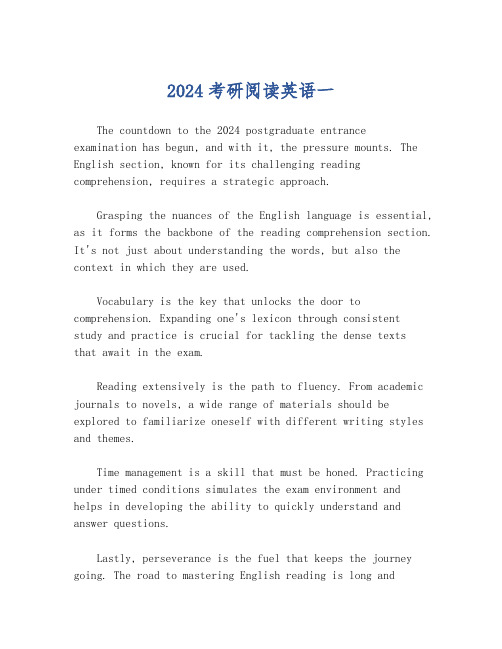
2024考研阅读英语一The countdown to the 2024 postgraduate entrance examination has begun, and with it, the pressure mounts. The English section, known for its challenging reading comprehension, requires a strategic approach.Grasping the nuances of the English language is essential, as it forms the backbone of the reading comprehension section. It's not just about understanding the words, but also the context in which they are used.Vocabulary is the key that unlocks the door to comprehension. Expanding one's lexicon through consistentstudy and practice is crucial for tackling the dense textsthat await in the exam.Reading extensively is the path to fluency. From academic journals to novels, a wide range of materials should be explored to familiarize oneself with different writing styles and themes.Time management is a skill that must be honed. Practicing under timed conditions simulates the exam environment andhelps in developing the ability to quickly understand and answer questions.Lastly, perseverance is the fuel that keeps the journey going. The road to mastering English reading is long andarduous, but with consistent effort and a positive mindset, success in the 2024 exam is within reach.。
考研英语时文赏读(65):一夜之间,巴黎圣母院惨遭焚毁
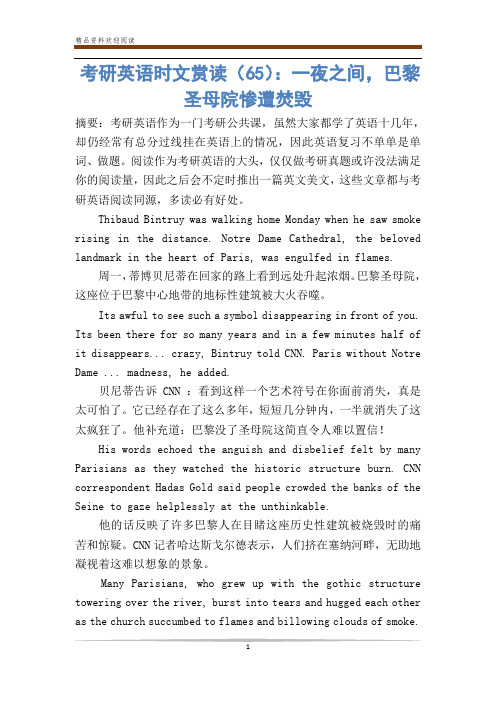
考研英语时文赏读(65):一夜之间,巴黎圣母院惨遭焚毁摘要:考研英语作为一门考研公共课,虽然大家都学了英语十几年,却仍经常有总分过线挂在英语上的情况,因此英语复习不单单是单词、做题。
阅读作为考研英语的大头,仅仅做考研真题或许没法满足你的阅读量,因此之后会不定时推出一篇英文美文,这些文章都与考研英语阅读同源,多读必有好处。
Thibaud Bintruy was walking home Monday when he saw smoke rising in the distance. Notre Dame Cathedral, the beloved landmark in the heart of Paris, was engulfed in flames.周一,蒂博贝尼蒂在回家的路上看到远处升起浓烟。
巴黎圣母院,这座位于巴黎中心地带的地标性建筑被大火吞噬。
Its awful to see such a symbol disappearing in front of you. Its been there for so many years and in a few minutes half of it disappears... crazy, Bintruy told CNN. Paris without Notre Dame ... madness, he added.贝尼蒂告诉CNN :看到这样一个艺术符号在你面前消失,真是太可怕了。
它已经存在了这么多年,短短几分钟内,一半就消失了这太疯狂了。
他补充道:巴黎没了圣母院这简直令人难以置信!His words echoed the anguish and disbelief felt by many Parisians as they watched the historic structure burn. CNN correspondent Hadas Gold said people crowded the banks of the Seine to gaze helplessly at the unthinkable.他的话反映了许多巴黎人在目睹这座历史性建筑被烧毁时的痛苦和惊疑。
2020考研英语二阅读理解

2020考研英语二阅读理解The 2020 Postgraduate Entrance English II exam was a pivotal moment for many aspirants, testing not only their linguistic prowess but also their analytical skills. The reading comprehension section was particularly challenging, filled with nuanced passages that demanded a deep understanding of both the text and the context.The passages spanned a variety of topics, from scientific breakthroughs to socio-economic issues, each requiring a different approach to interpretation. Candidates had to navigate through complex sentences and dense information, extracting the essence of the arguments presented.One of the passages that stood out was an article on environmental conservation, which presented a compelling case for sustainable practices. The author's use of vivid examples and persuasive language made the topic both engaging and thought-provoking.Another segment delved into the advancements inartificial intelligence, highlighting the ethical dilemmas and potential societal impacts. The text was peppered with technical jargon, which added an extra layer of difficultyfor those not familiar with the subject matter.The questions that followed each passage were designed to assess the examinees' comprehension and inference abilities.They ranged from straightforward factual recall to more complex analytical queries that required a synthesis of ideas from the text.The time constraint added to the pressure, as candidates had to quickly yet accurately process and respond to the questions. It was a true test of their ability to balance speed with thoroughness.Despite the challenges, many found the experience rewarding, as it pushed them to refine their reading strategies and deepen their understanding of the English language. The exam served as a stepping stone towards their academic and professional goals, a testament to their dedication and perseverance.In retrospect, the 2020 English II exam was more thanjust an assessment; it was an opportunity for growth and a reflection of the candidates' journey towards academic excellence.。
考研英语时文阅读(2)
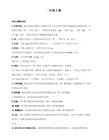
考研英语历年真题阅读理解精读笔记(九)

考研英语历年真题阅读理解精读笔记(九)TEXT 2To paraphrase 18th century statesman Edmund Burke, all that is needed for the triumph of a misguided cause is that good people do nothing. One such cause now seeks to end biomedical research because of the theory that animals have rights ruling out their use in research. Scientists need to respond forcefully to animal rights advocates, whose arguments are confusing the public and thereby threatening advances in health knowledge and care.Leaders of the animal rights movement target biomedical research because it depends on public funding, and few people understand the process of health care research.Hearing allegations of cruelty to animals in research settings, many are perplexed that anyone would deliberately harm an animal.For example, a grandmotherly woman staffing an animal rights booth at a recent street fair was distributing a brochure that encouraged readers not to use anything that comes from or is tested in animals-no meat, no fur, no medicines.Asked if she opposed immunizations, she wanted toknow if vaccines come from animal research.When assured that they do, she replied, Then I would have to say yes. Asked what will happen when epidemics return, she said, Don't worry, scientists will find some way of using computers.Such well meaning people just don't understand.Scientists must communicate their message to the public in a compassionate, understandable way-in human terms, not in the language of molecular biology.We need to make clear the connection between animal research and a grandmother's hip replacement, a father's bypass operation, a baby's vaccinations, and even a pet's shots.To those who are unaware that animal research was needed to produce these treatments, as well as new treatments and vaccines, animal research seems wasteful at best and cruel at worst.Much can be done.Scientists could adopt middle school classes and present their own research.They should be quick to respond to letters to the editor, lest animal rights misinformation go unchallenged and acquire a deceptive appearance of truth.Research institutions could be opened to tours, to show that laboratory animals receive humane care.Finally, because the ultimate stakeholders are patients, the health research community should actively recruit to its causenot only well-known personalities such as Stephen Cooper, who has made courageous statements about the value of animal research, but all who receive medical treatment.If good people do nothing there is a real possibility that an uninformed citizenry will extinguish the precious embers of medical progress.46. The author begins his article with Edmund Burke's words to .A.call on scientists to take some actionsB.criticize the misguided cause of animal rightsC.warn of the doom of biomedical researchD.show the triumph of the animal rights movement47. Misled people tend to think that using an animal in research is .A.cruel but naturalB.inhuman and unacceptableC.inevitable but viciousD.pointless and wasteful48. The example of the grandmotherly woman is used to show the public's .A.discontent with animal researchB.ignorance about medical scienceC.indifference to epidemicsD.anxiety about animal rights49. The author believes that, in face of the challenge from animal rights advocates, scientists should .A.communicate more with the publicB.employ hi-tech means in researchC.feel no shame for their causeD.strive to develop new cures50. From the text we learn that Stephen Cooper is .A.a well-known humanistB.a medical practitionerC.an enthusiast in animal rightsD.a supporter of animal researchacquire7 v.①取得,获得,占有;②学到action11 n.①行动,行为;②动作,活动;③(on)作用adopt4 v.①采用,采纳,通过;②收养anxiety3 n.①挂念,焦虑,焦急,忧虑;②渴望,热望appearance3 n.①出现,出场,露面;②外表,外貌,外观argument6 n.①争论,辨认;②论据,论点,理由assure2 v.①使确信,使放心;②保证,担保author69 n.①作者;②创始人biology4 n.生物学booth1 n.电话亭,货摊brochure1 n.小册子bypass1 n.旁路,迂回的旁道cause28 n.①原因,理由;②事业,事件,奋斗目标;v.使产生,引起challenge10 n.①挑战(书);②艰巨任务,难题;v.向...挑战communicate3 v.①传达,传送;②交流;③通讯,通话community17 n.①同一地区的全体居民,社会,社区;②共同体,团体confuse9 v.使混乱,混淆connection2 n.联系,连接criticize3 v.批评,评论depend16 v.(on)取决于,依靠,信赖,相信distribute1 v.①分发,分配;②分布;③配(电);④(over)散布doom2 n.厄运,劫数;v.注定,命定editor2 n.编辑,编者encourage13 v.鼓励,怂恿epidemic1 a.①流行性的;②传染的;n.①流行病;②传播extinguish1 v.熄灭,扑灭fair9 a.①公平的,合理的;②相当的,尚好的;③晴朗的;④金发的;n.集市,交易会,博览会fur1 n.毛,毛皮harm2 n./v.伤害,损害,危害hip2 n.髋部;a.时髦的ignorance1 n.①无知,愚昧;②不知道inevitable5 a.不可避免的,必然发生的institution4 n.①公共机构,协会,学校;②制度,惯例knowledge15 n.①知识,学识;②知道,了解laboratory3 n.实验室lest3 conj.惟恐,免得means32 n.方法,手段mislead4 v.把...带错路,使误入歧途oppose7 v.反对,反抗perplex2 v.使困惑,使费解,使复杂化personality9 n.①人格,个性;②人物,名人practitioner2 n.从业者,开业者present16 a.①出席的,到场的;②现在的,目前的;n.①现在,目前;②礼物,赠品;v.①赠(送),呈献;②介绍,陈述;③提出,呈交;④上演process34 n.①过程,进程;②工序,制作法;③工艺;v.加工,处理recruit1 v.招募(新兵),招收(新成员);n.新兵,新成员replacement1 n.取代,替换,替换物,代替物respond8 v.①回答,答复;②(to)响应school44 n.①学校;②(大学里的)学院,系;③学派,流派science58 n.①科学;②学科setting6 n.①安置,安装;②(日,月的)沉落;③(固定东西的)柜架底座;④环境,背景staff5 n.①全体职工,全体人员;②杠,棒;③参谋部;v.配备工作人员statement7 n.声明,陈述statesman1 n.政治家strive5 v.奋斗,努力target5 n.目标,对象,靶子;vt.以...为目标tend26 v.①趋向,往往是;②照料,看护theory20 n.①理论,原理;②学说,见解,看法;③看法,观点threaten8 v.①恐吓,威胁;②有...危险,快要来临triumph4 n.胜利,成功;v.得胜,战胜ultimate2 a.①最后的,最终的;②根本的vicious1 a.恶毒的,凶残的,邪恶的advance10 v.①前进,进展;②推进,促进;③提出(建议等);④提前;n.①前进,进展;②预付,预支advocate13 n.提倡者,鼓吹者;v.提倡,鼓吹allegation1 n.主张,断言,辩解biomedical2 a.生物医学的citizenry2 n.公民或市民(集合称)compassionate1 a.有同情心的courageous1 a.勇敢的,有胆量的cruelty1 n.残忍,残酷deceptive2 a.欺骗性的deliberately1 ad.故意地discontent2 n.不满ember1 n.灰烬,余烬enthusiast1 n.热心家,狂热者funding6 n.基金,资金humane1 a.仁慈的,人道的,人文的humanist1 n.人道主义者,人文主义者immunization1 n.使免除,使免疫indifference2 n.不关心,冷漠inhuman1 a.野蛮的leader10 n.misinformation1 n.报错,错误的消息molecular2 a.分子的,由分子组成的paraphrase1 v.解释;n.解释pointless1 a.无意义的stakeholder1 n.股东,赌金保管者treatment7 n.待遇,对待,处理,治疗unacceptable2 a.无法接受的,不受欢迎的unaware3 a.不知道的,没觉察到的unchallenged1 a.未受到挑战的,未引起争论的,不成问题的uninformed1 a.未被通知的,无知的,未受教育的vaccination1 n.种痘,接种疫苗vaccine2 a.疫苗的,牛痘的;n.疫苗难句1To paraphrase 18th century statesman Edmund Burke, all that is needed for the triumph of a misguided cause is that good people do nothing.[结构分析]1. 本句主要部分是直接引语,直接引语的句子主干部分是:... all ... is + that引导的表语从句;2. all后面的that引导定语从句,修饰all;3. is后面的that引导表语从句;[本句难点]主要是直接引语中两个that和两个is影响理解;[方法对策]分清直接引语中的主干和修饰成分就比较好理解本句了;[例句精译]18世纪政治家爱德蒙·博克曾说过类似这样的话,好人的沉默和旁观,就可以导致坏人事业的胜利。
2024考研英语二阅读text3

2024考研英语二阅读text3 In the text, the author discusses the issue of climate change and its impact on the Arctic region. The text highlights the increasing temperatures in the Arctic, which are causing the ice to melt at an alarming rate. This hassignificant implications for the environment, wildlife, and indigenous communities in the region. The author also emphasizes the role of human activities,particularly the burning of fossil fuels, in contributing to climate change. Additionally, the text touches upon the geopolitical implications of a melting Arctic, as it opens up new opportunities for resource extraction and shipping routes. From an environmental perspective, the melting of the Arctic ice is a cause for great concern. The loss of ice not only disrupts the delicate balance of the Arctic ecosystem but also contributes to rising sea levels globally. This has serious implications for coastal communities around the world, as they face the threat of flooding and erosion. Furthermore, the melting of the ice contributes to ocean acidification, which has a detrimental impact on marine life. The text effectively conveys the urgency of addressing climate change to mitigate these environmental consequences. The text also sheds light on the impact of climate change on indigenous communities in the Arctic. These communities rely on the ice and snow for their traditional ways of life, including hunting and fishing. The rapid changes in the environment pose a direct threat to their livelihoods and cultural practices. Additionally, the melting ice exposes these communities to new challenges, such as the loss of traditional food sources and the erosion of their land. The text effectively captures the human dimension of climate change, emphasizing the need to consider the impact on vulnerable communities. Moreover, the text discusses the geopolitical implications of a melting Arctic. As the ice recedes, new opportunities for resource extraction and shipping routes emerge. This has sparked competition among various countries seeking to exploit theregion's resources and assert their influence. The text highlights the potential for conflicts to arise as nations vie for control over the Arctic. This geopolitical dimension adds another layer of complexity to the issue of climate change in the region, as it involves not only environmental concerns but also political and economic interests. In conclusion, the text effectively conveys themultifaceted nature of the issue of climate change in the Arctic. It emphasizes the environmental, social, and geopolitical implications of the melting ice, urging readers to consider the far-reaching consequences of inaction. By presenting a comprehensive overview of the issue, the text encourages a deeper understanding of the challenges posed by climate change in the Arctic and the need for concerted efforts to address them.。
考研英语时文阅读(25)
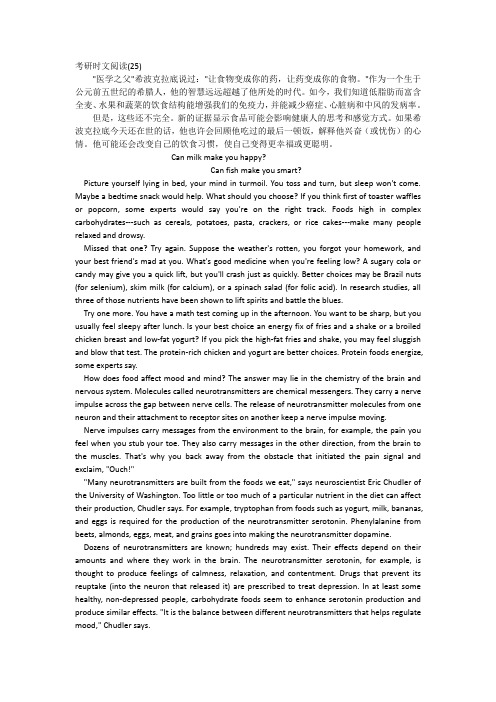
考研时文阅读(25)"医学之父"希波克拉底说过:"让食物变成你的药,让药变成你的食物。
"作为一个生于公元前五世纪的希腊人,他的智慧远远超越了他所处的时代。
如今,我们知道低脂肪而富含全麦、水果和蔬菜的饮食结构能增强我们的免疫力,并能减少癌症、心脏病和中风的发病率。
但是,这些还不完全。
新的证据显示食品可能会影响健康人的思考和感觉方式。
如果希波克拉底今天还在世的话,他也许会回顾他吃过的最后一顿饭,解释他兴奋(或忧伤)的心情。
他可能还会改变自己的饮食习惯,使自己变得更幸福或更聪明。
Can milk make you happy?Can fish make you smart?Picture yourself lying in bed, your mind in turmoil. You toss and turn, but sleep won't come. Maybe a bedtime snack would help. What should you choose? If you think first of toaster waffles or popcorn, some experts would say you're on the right track. Foods high in complex carbohydrates---such as cereals, potatoes, pasta, crackers, or rice cakes---make many people relaxed and drowsy.Missed that one? Try again. Suppose the weather's rotten, you forgot your homework, and your best friend's mad at you. What's good medicine when you're feeling low? A sugary cola or candy may give you a quick lift, but you'll crash just as quickly. Better choices may be Brazil nuts (for selenium), skim milk (for calcium), or a spinach salad (for folic acid). In research studies, all three of those nutrients have been shown to lift spirits and battle the blues.Try one more. You have a math test coming up in the afternoon. You want to be sharp, but you usually feel sleepy after lunch. Is your best choice an energy fix of fries and a shake or a broiled chicken breast and low-fat yogurt? If you pick the high-fat fries and shake, you may feel sluggish and blow that test. The protein-rich chicken and yogurt are better choices. Protein foods energize, some experts say.How does food affect mood and mind? The answer may lie in the chemistry of the brain and nervous system. Molecules called neurotransmitters are chemical messengers. They carry a nerve impulse across the gap between nerve cells. The release of neurotransmitter molecules from one neuron and their attachment to receptor sites on another keep a nerve impulse moving.Nerve impulses carry messages from the environment to the brain, for example, the pain you feel when you stub your toe. They also carry messages in the other direction, from the brain to the muscles. That's why you back away from the obstacle that initiated the pain signal and exclaim, "Ouch!""Many neurotransmitters are built from the foods we eat," says neuroscientist Eric Chudler of the University of Washington. Too little or too much of a particular nutrient in the diet can affect their production, Chudler says. For example, tryptophan from foods such as yogurt, milk, bananas, and eggs is required for the production of the neurotransmitter serotonin. Phenylalanine from beets, almonds, eggs, meat, and grains goes into making the neurotransmitter dopamine. Dozens of neurotransmitters are known; hundreds may exist. Their effects depend on their amounts and where they work in the brain. The neurotransmitter serotonin, for example, is thought to produce feelings of calmness, relaxation, and contentment. Drugs that prevent its reuptake (into the neuron that released it) are prescribed to treat depression. In at least some healthy, non-depressed people, carbohydrate foods seem to enhance serotonin production and produce similar effects. "It is the balance between different neurotransmitters that helps regulate mood," Chudler says.Proper nutrition may also enhance brainpower. Chorine is a substance similar to the B vitamins. It's found in egg yolks, whole wheat, peanuts, milk, green peas, liver, beans, seafood, and soybeans. The brain uses it to make the neurotransmitter acetylcholine. To test the effects of chorine on memory and learning, researchers at the Massachusetts Institute of Technology gave memory tests to college students before increasing the amount of chorine in their subjects’ diets. Later, they retested. On the average, memories were better, and the students learned a list of unrelated words more easily.核心词汇picture v. 想象,设想; (常后接介词as) ,相当于imagineturmoil n. 骚动,混乱(disorder=mess)snack n. 小吃,零食;on the right track(在合适或正确的小路或轨道上),比喻为:做某事情是对的。
2018年可锐考研英语阅读真题范文
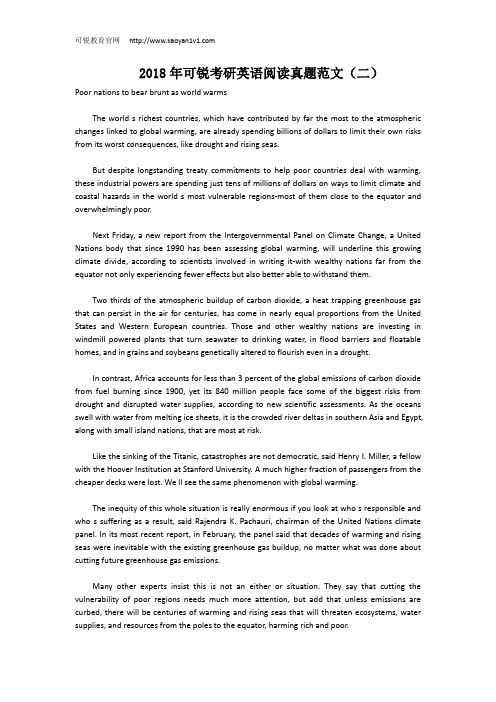
2018年可锐考研英语阅读真题范文(二)Poor nations to bear brunt as world warmsThe world s richest countries, which have contributed by far the most to the atmospheric changes linked to global warming, are already spending billions of dollars to limit their own risks from its worst consequences, like drought and rising seas.But despite longstanding treaty commitments to help poor countries deal with warming, these industrial powers are spending just tens of millions of dollars on ways to limit climate and coastal hazards in the world s most vulnerable regions-most of them close to the equator and overwhelmingly poor.Next Friday, a new report from the Intergovernmental Panel on Climate Change, a United Nations body that since 1990 has been assessing global warming, will underline this growing climate divide, according to scientists involved in writing it-with wealthy nations far from the equator not only experiencing fewer effects but also better able to withstand them.Two thirds of the atmospheric buildup of carbon dioxide, a heat trapping greenhouse gas that can persist in the air for centuries, has come in nearly equal proportions from the United States and Western European countries. Those and other wealthy nations are investing in windmill powered plants that turn seawater to drinking water, in flood barriers and floatable homes, and in grains and soybeans genetically altered to flourish even in a drought.In contrast, Africa accounts for less than 3 percent of the global emissions of carbon dioxide from fuel burning since 1900, yet its 840 million people face some of the biggest risks from drought and disrupted water supplies, according to new scientific assessments. As the oceans swell with water from melting ice sheets, it is the crowded river deltas in southern Asia and Egypt, along with small island nations, that are most at risk.Like the sinking of the Titanic, catastrophes are not democratic, said Henry I. Miller, a fellow with the Hoover Institution at Stanford University. A much higher fraction of passengers from the cheaper decks were lost. We ll see the same phenomenon with global warming.The inequity of this whole situation is really enormous if you look at who s responsible and who s suffering as a result, said Rajendra K. Pachauri, chairman of the United Nations climate panel. In its most recent report, in February, the panel said that decades of warming and rising seas were inevitable with the existing greenhouse gas buildup, no matter what was done about cutting future greenhouse gas emissions.Many other experts insist this is not an either or situation. They say that cutting the vulnerability of poor regions needs much more attention, but add that unless emissions are curbed, there will be centuries of warming and rising seas that will threaten ecosystems, water supplies, and resources from the poles to the equator, harming rich and poor.二.The falling dollarTHE dollar s tumble this week was attended by predictable shrieks from the markets; but as it fell to a 20 month low of $1.32 against the euro, the only real surprise was that it had not slipped sooner. Indeed, there are good reasons to expect its slide to continue, dragging it below the record low of $1.36 against the euro that it hit in December 2004.The recent decline was triggered by nasty news about the American economy. New figures this week suggested that the housing market s troubles are having a wider impact on the economy. Consumer confidence and durable goods orders both fell more sharply than expected. In contrast, German business confidence has risen to a 15 year high. There are also mounting concerns that central banks in China and elsewhere, which have been piling up dollars assiduously for years, may start selling.Yet cyclical factors only partly explain why the dollar has been strong. At bottom, its attractiveness is based more on structural factors-or, more accurately, on an illusion about structural differences between the American and European economies.The main reason for the dollar s strength has been the widespread belief that the American economy vastly outperformed the world s other rich country economies in recent years. But the figures do not support the hype. Sure, America s GDP growth has been faster than Europe s, but that is mostly because its population has grown more quickly too. Dig deeper and the difference shrinks. Official figures of productivity growth, which should in theory be an important factor driving currency movements, exaggerate America s lead. If the two are measured on a comparable basis, productivity growth over the past decade has been almost the same in the euro area as it has in America. Even more important, the latest figures suggest that, whereas productivity growth is now slowing in America, it is accelerating in the euro zone.So, contrary to popular perceptions, America s economy has not significantly outperformed Europe s in recent years. And to achieve this not much better than parity, America has had to pump itself full of steroids. Since 2000 its structural budget deficit has widened sharply, while American households saving rate has plunged, causing the current account deficit to swell. Over the same period, the euro area economies saw no fiscal stimulus and household saving barely budged.America s growth, thus, has been driven by consumer spending. That spending, supported by dwindling saving and increased borrowing, is clearly unsustainable; and the consequent economic and financial imbalances must inevitably unwind. As that happens, the country could face a prolonged period of slower growth.As for Europe, the old continent is hobbled by inflexible product and labour markets. But that, paradoxically, is an advantage: it means the place has a lot of scope for improvement. SomeEuropean countries are beginning to contemplate economic reforms. If they push ahead, their growth could actually speed up over the coming years. Once investors spot this, they are likely to conclude that the euro is a better bet than the dollar.三.Can milk make you happy Can fish make you smartImagine yourself lying in bed, your mind in turmoil. You toss and turn, but sleep won t come. Maybe a bedtime snack would help. What should you choose If you think first of toaster waffles or popcorn, some experts would say you re on the right track. Foods high in complex carbohydrates-such as cereals, potatoes, pasta, crackers, or rice cakes-make many people relaxed and drowsy.Missed that one Try again. Suppose the weather s rotten, you forgot your homework, and your best friend s mad at you. What s good medicine when you re feeling low A sugary cola or candy may give you a quick lift, but you ll crash just as quickly. Better choices may be Brazil nuts , skim milk , or a spinach salad . In research studies, all three of those nutrients have been shown to lift spirits and battle the blues.Try one more. You have a math test coming up in the afternoon. You want to be sharp, but you usually feel sleepy after lunch. Is your best choice an energy fix of fries and a shake or a broiled chicken breast and low fat yogurt If you pick the high fat fries and shake, you may feel sluggish and blow that test. The protein rich chicken and yogurt are better choices. Protein foods energize, some experts say.How does food affect mood and mind The answer may lie in the chemistry of the brain and nervous system. Molecules called neurotransmitters are chemical messengers. They carry a nerve impulse across the gap between nerve cells. The release of neurotransmitter molecules from one neuron and their attachment to receptor sites on another keep a nerve impulse moving.Nerve impulses carry messages from the environment to the brain, for example, the pain you feel when you stub your toe. They also carry messages in the other direction, from the brain to the muscles. That s why you back away from the obstacle that initiated the pain signal and exclaim, Ouch!Many neurotransmitters are built from the foods we eat, says neuroscientist Eric Chudler of the University of Washington. Too little or too much of a particular nutrient in the diet can affect their production, Chudler says. For example, tryptophan from foods such as yogurt, milk, bananas, and eggs is required for the production of the neurotransmitter serotonin. Phenylalanine from beets, almonds, eggs, meat, and grains goes into making the neurotransmitter dopamine.Dozens of neurotransmitters are known; hundreds may exist. Their effects depend on theiramounts and where they work in the brain. The neurotransmitter serotonin, for example, is thought to produce feelings of calmness, relaxation, and contentment. Drugs that prevent its reuptake are prescribed to treat depression. In at least some healthy, nondepressed people, carbohydrate foods seem to enhance serotonin production and produce similar effects. It is the balance between different neurotransmitters that helps regulate mood, Chudler says.Proper nutrition may also enhance brainpower. Choline is a substance similar to the B vitamins. It s found in egg yolks, whole wheat, peanuts, milk, green peas, liver, beans, seafood, and soybeans. The brain uses it to make the neurotransmitter acetylcholine. To test the effects of choline on memory and learning, researchers at the Massachusetts Institute of Technology gave memory tests to college students before increasing the amount of choline in their subjects diets. Later, they retested. On the average, memories were better, and the students learned a list of unrelated words more easily.。
燃烧单词考研真题答案
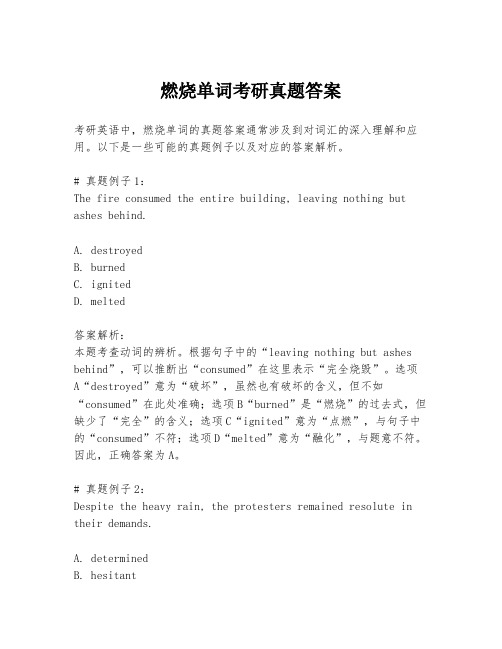
燃烧单词考研真题答案考研英语中,燃烧单词的真题答案通常涉及到对词汇的深入理解和应用。
以下是一些可能的真题例子以及对应的答案解析。
# 真题例子1:The fire consumed the entire building, leaving nothing but ashes behind.A. destroyedB. burnedC. ignitedD. melted答案解析:本题考查动词的辨析。
根据句子中的“leaving nothing but ashes behind”,可以推断出“consumed”在这里表示“完全烧毁”。
选项A“destroyed”意为“破坏”,虽然也有破坏的含义,但不如“consumed”在此处准确;选项B“burned”是“燃烧”的过去式,但缺少了“完全”的含义;选项C“ignited”意为“点燃”,与句子中的“consumed”不符;选项D“melted”意为“融化”,与题意不符。
因此,正确答案为A。
# 真题例子2:Despite the heavy rain, the protesters remained resolute in their demands.A. determinedB. hesitantC. indecisiveD. uncertain答案解析:本题考查形容词的辨析。
“resolute”意为“坚决的,坚定的”,与句子中的“Despite the heavy rain”形成对比,表明抗议者的决心并未因恶劣天气而动摇。
选项A“determined”意为“决心的”,与“resolute”意思相近,但“resolute”更强调坚定性;选项B“hesitant”意为“犹豫的”,与题意不符;选项C“indecisive”意为“优柔寡断的”,同样与题意不符;选项D“uncertain”意为“不确定的”,也不符合句子含义。
因此,正确答案为A。
# 真题例子3:The new policy has alleviated the financial burden on small businesses.A. increasedB. reducedC. intensifiedD. alleviated答案解析:本题考查动词的辨析。
2024考研英语1阅读
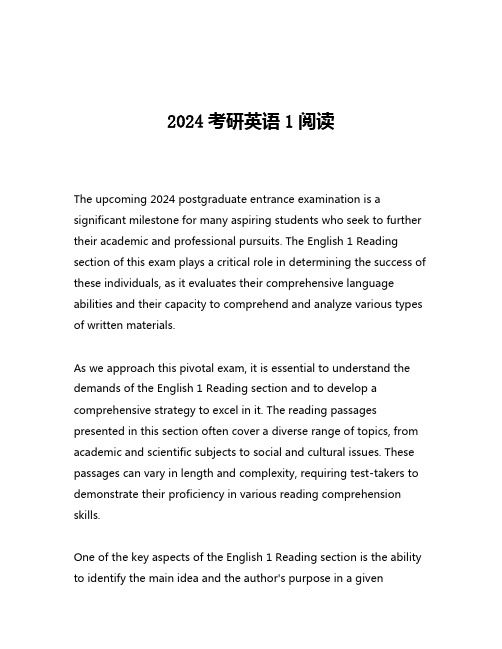
2024考研英语1阅读The upcoming 2024 postgraduate entrance examination is a significant milestone for many aspiring students who seek to further their academic and professional pursuits. The English 1 Reading section of this exam plays a critical role in determining the success of these individuals, as it evaluates their comprehensive language abilities and their capacity to comprehend and analyze various types of written materials.As we approach this pivotal exam, it is essential to understand the demands of the English 1 Reading section and to develop a comprehensive strategy to excel in it. The reading passages presented in this section often cover a diverse range of topics, from academic and scientific subjects to social and cultural issues. These passages can vary in length and complexity, requiring test-takers to demonstrate their proficiency in various reading comprehension skills.One of the key aspects of the English 1 Reading section is the ability to identify the main idea and the author's purpose in a givenpassage. Successful test-takers must be able to discern the central theme or argument being presented and comprehend the underlying message or perspective of the author. This requires a deep understanding of the text, as well as the ability to draw inferences and make connections between different parts of the passage.Another important skill tested in the English 1 Reading section is the ability to identify and analyze the supporting details and evidence presented in the passage. Test-takers must be able to recognize the specific examples, facts, and explanations that the author uses to support their main argument or point of view. This not only demonstrates a thorough understanding of the content but also the ability to critically evaluate the strength and relevance of the supporting information.In addition to these fundamental reading comprehension skills, the English 1 Reading section also assesses the test-takers' ability to understand the structure and organization of the passage. This includes identifying the key transitions, the logical flow of ideas, and the relationship between different sections or paragraphs. By mastering these skills, test-takers can better navigate the complex passages and extract the most relevant information to answer the accompanying questions.To prepare for the English 1 Reading section, it is essential for aspiring postgraduate students to engage in a comprehensive and systematic study plan. This plan should involve regular practice with a diverse range of reading materials, including academic journals, newspapers, and literature. By exposing themselves to a variety of text types and genres, students can develop a broader understanding of language usage, writing styles, and the strategies employed by authors to convey their ideas.Another key component of effective preparation is the development of critical thinking and analytical skills. Test-takers should practice identifying the underlying assumptions, biases, and perspectives presented in the passages, and learn to evaluate the strength and validity of the arguments. This not only enhances their performance on the exam but also cultivates a deeper appreciation for the nuances and complexities of written communication.Furthermore, it is crucial for aspiring postgraduate students to familiarize themselves with the format and structure of the English 1 Reading section. By understanding the types of questions that are typically asked, the time management strategies required, and the scoring rubric, they can better optimize their preparation and approach the exam with confidence.In conclusion, the English 1 Reading section of the 2024postgraduate entrance examination presents a significant challenge for many aspiring students. However, by developing a comprehensive understanding of the required skills, engaging in regular and targeted practice, and adopting effective test-taking strategies, these students can position themselves for success. Through their dedication and hard work, they can not only excel in this crucial component of the exam but also lay the foundation for their future academic and professional pursuits.。
考研英语阅读理解精读练习十三

考研英语阅读理解精读练习Boosted by booming international financial markets, the City of London has not had it so good since the end of the dotcom bonanza in the late 1990s. Basking in double-digit growth rates, London's law firms have both contributed to that success and benefited from it. The earnings of top City lawyers can now exceed £2m a year.Having opted to expand and go global ahead of most others, Britain's leading law firms tend to be bigger than their American rivals. Indeed, according to a survey of the world's top 50 law firms, compiled by Legal Business, a British trade paper, five of the world's top six law firms—in terms of turnover—are now British (if DLA Piper, the result of an Anglo-American merger, is included). But they have tended to lag behind in terms of their profitability. That is now changing.The profit margins of the City's five “magic circle” firms—Clifford Chance, Slaughter and May, Allen & Overy, Linklaters and Freshfields—have soared in recent years and are now comparable with, if not higher than, those of New York's “white shoe” elite. Slaughter and May, the only one of the five not to have gone global, has the joint second-highest profit margin among the top 50.Not so long ago, a London surgeon could expect to earn as much as a City lawyer. But even the recent big rises in hospital consultants' earnings pall in comparison with those enjoyed by London lawyers. At Slaughter and May, for example, average profits per equity partner (PEP) jumped by almost a third (in dollar terms) last year to$2.75m—more than at any other of the top 50 law firms bar two in New York where PEP averaged $2.8m and $3.0m respectively. Some senior partners get a lot more of course.Competition for the best lawyers is fierce and poaching frequent. Hence the need to keep headline PEP figures up—even at the cost of getting rid of equity partners, leaving a bigger share of the bounty for the remaining ones. Freshfields is in the process of shedding around 100 of its equity partners. Other leading firms are also undertaking painful restructuring.Newly qualified lawyers' salaries have also been shooting up in the search for the best talent. Both Freshfields and Allen & Overy now pay their first-year associates £65,000, rising to around £90,000 after three years. (First-year associates at America's top law firms get the equivalent of £80,000.)But, as many other top-rank City employers have discovered, big earnings do not necessarily guarantee big satisfaction. According to a YouGov poll, published by the Lawyer earlier this month, a quarter of Britain's lawyers (including a fifth of law-firm partners) would like to leave the profession. The disgruntled complained about cripplingly long hours, intense competition and the impersonality of the biggest firms (some with more than 3,000 lawyers). So why don't they quit? Because, saythree-quarters, of the pay.1. Which one of the following is TURE of the status quo of London’s economy?[A] London is enjoying its best time of economic development since 1990s.[B] The growth rate of London is doubled since the beginning of the 1990s.[C] The growth rate started to boost since the end of the dotcom era.[D] The current economy of London is mostly driven by its legal instead of financial market.2. The world’s top 50 law firms are graded according to _____[A] their annual margin.[B] their profitability.[C] their sale volume.[D] their quantity of business.3.The phrase “white shoe” (Line 3, Paragraph 3) most probably means____[A] white collars.[B] first-class law firms.[C] financial agencies.[D] international banks.4. In order to be competitive, the law firms take the following measures except_____.[A] dismissing equity partners.[B] carrying out restructuring.[C] having their best lawyers turn more competitive.[D] raising salaries for recruiting talents.5. From the YouGov poll, it can be inferred that____[A] this profession is far from satisfactory.[B] most lawyers will leave the profession sooner or later.[C] most lawyers are satisfied with the profession because of the fat pay.[D] high salary is always contradictory to big satisfaction.文章剖析:这篇文章介绍英国伦敦律师事务所的现状。
2022考研英语阅读沉冤得雪的黄瓜

2022考研英语阅读沉冤得雪的黄瓜Don t shoot the cucumber沉冤得雪的黄瓜A deadly outbreak in Hamburg causes ripples roundEurope爆发在汉堡的致命性疫情引发欧洲震荡SEVENTEEN deaths, some 1,500 confirmed orsuspected cases and hundreds of millions of euros inlosses: the outbreak of E. coli infections in northernGermany is causing havoc across Europe. The culpritis an especially nasty strain of E. coli, which normallyresides harmlessly in the gut. Type O104:H4 can causebloody diarrhoea, convulsions and, most lethally,haemolytic-uraemic syndrome, which attacks thekidneys. Nearly all the dead are women. Nobody knowswhy.7人死亡,约1500例确认或者疑似病例,数以亿计欧元的经济损失:在德国北部爆发的大肠杆菌疫情让整个欧洲都陷入了一片混乱。
罪魁祸首是特殊恶心的大肠杆菌族的一种,通常状况下驻于肠内且对人体无害。
这种叫O104:H4型的大肠杆菌能造成出血性腹泻,痉挛,以及更为致命的溶血性尿毒综合征症状,引发肾衰竭。
几乎全部的死者都是女性。
没人能解释这一现象。
German health authorities at first traced the infection to organic cucumbers from Spain andadvised people to avoid them,along with salad and raw tomatoes. Now it seems the cucumberswere innocent . But thevegetable warning still stands, and the economic and political damage is mounting.德国卫生部门最先把疫情元凶定为从西班牙进口的有机黄瓜,并告诫民众避开食用它们,包括沙拉和生西红柿。
2019经济学人考研英文文章阅读一二五
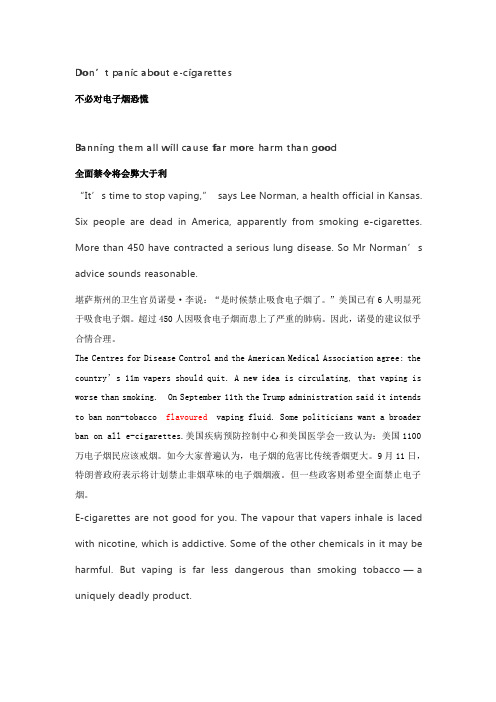
Don’t panic about e-cigarettes不必对电子烟恐慌Banning them all will cause far more harm than good全面禁令将会弊大于利“It’s time to stop vaping,”says Lee Norman,a health official in Kansas. Six people are dead in America,apparently from smoking e-cigarettes. More than450have contracted a serious lung disease.So Mr Norman’s advice sounds reasonable.堪萨斯州的卫生官员诺曼·李说:“是时候禁止吸食电子烟了。
”美国已有6人明显死于吸食电子烟。
超过450人因吸食电子烟而患上了严重的肺病。
因此,诺曼的建议似乎合情合理。
The Centres for Disease Control and the American Medical Association agree:the country’s11m vapers should quit.A new idea is circulating,that vaping is worse than smoking.On September11th the Trump administration said it intends to ban non-tobacco flavoured vaping fluid.Some politicians want a broader ban on all e-cigarettes.美国疾病预防控制中心和美国医学会一致认为:美国1100万电子烟民应该戒烟。
如今大家普遍认为,电子烟的危害比传统香烟更大。
9月11日,特朗普政府表示将计划禁止非烟草味的电子烟烟液。
燃烧单词考研真题及答案

燃烧单词考研真题及答案燃烧单词考研真题及答案考研英语作为研究生入学考试的一部分,对于很多考生来说是一道难以逾越的高山。
其中,词汇题是考生们最为头疼的一部分。
而燃烧单词考研真题及答案的学习和掌握,对于提高词汇题的答题能力具有重要的意义。
燃烧单词考研真题是指那些难度较高,需要考生对单词的理解和应用能力较强的题目。
这些题目往往会涉及到词义辨析、词组搭配、词性转换等多个方面。
通过研究和分析这些燃烧单词考研真题及答案,考生们可以更好地了解考试的出题思路,提高自己的词汇运用能力。
首先,我们来看一个燃烧单词考研真题:1. The manager asked the secretary to ________ the meeting because of his busy schedule.A. put offB. put outC. put upD. put down这道题目考察的是动词短语的搭配。
通过对选项的分析,我们可以发现选项A“put off”是符合题意的正确答案。
而选项B“put out”是指扑灭火焰,与题目无关;选项C“put up”是指搭建或支撑,也与题目无关;选项D“put down”是指放下或写下,同样与题目无关。
因此,我们可以得出正确答案为A。
接下来,我们来看一道稍微复杂一些的燃烧单词考研真题:2. The book provides a ________ of the history of ancient China, covering various aspects such as politics, economy, and culture.A. summaryB. analysisC. descriptionD. interpretation这道题目考察的是名词的辨析。
通过对选项的分析,我们可以发现选项A“summary”是符合题意的正确答案。
而选项B“analysis”是指对事物进行分析,与题目无关;选项C“description”是指对事物进行描述,也与题目无关;选项D“interpretation”是指对事物进行解释,同样与题目无关。
考研时文阅读二选自《经济学人》

考研时文阅读二选自《经济学人》AMID the hubbub over a few less-bad-than-expected statistics, America’s economic debate has turned to the nature of the recovery. Optimists expect a vigorous rebound as confidence returns, pent-up demand is unleashed and massive government stimulus takes effect. Most observers, including this newspaper, are bracing for a long slog, as debt-laden consumers rebuild their savings, output growth remains weak and unemployment continues to rise. There is, however, something that eventually will have a much bigger impact on Americans’ prosperity than the slope of the recovery. That is the effect of the crisis on America’s potential rate of growth itself.在对一些比预期稍好的数据的聒噪中,对美国经济的争论倒向了恢复的一边。
乐观人士预计在信心回稳、抑制的需求得到释放以及政府大规模刺激方案取得成效的情况下,经济会有力的反弹。
包括本报在内的多数观察家则认为慢慢前路仍充满艰险,因为深陷债务泥潭的消费者在重新建立他们的储蓄,出口增长依然疲软而且未就业人数继续上升。
- 1、下载文档前请自行甄别文档内容的完整性,平台不提供额外的编辑、内容补充、找答案等附加服务。
- 2、"仅部分预览"的文档,不可在线预览部分如存在完整性等问题,可反馈申请退款(可完整预览的文档不适用该条件!)。
- 3、如文档侵犯您的权益,请联系客服反馈,我们会尽快为您处理(人工客服工作时间:9:00-18:30)。
考研备考英语时文阅读:BurnishedUp goes gold, down goes the dollarMost economists hate gold. Not, you understand, that they would turn up their noses at a bar or two. But they find the reverence in which many hold the metal almost irrational. That it was used as money for millennia is irrelevant: it isn't any more. Modern money takes the form of paper or, more often, electronic data. To economists, gold is now just another commodity.So why is its price soaring? Over the past week, this has topped $450 a troy ounce, up by 9% since the beginning of the year and 77% since April 2001. Ah, comes the reply, gold transactions are denominated in dollars, and the rise in the price simply reflects the dollar's fall in terms of other currencies, especially the euro, against which it hit a new low this week. Expressed in euros, the gold price has moved much less. However, there is no iron link, as it were, between the value of the dollar and the value of gold. A rising price of gold, like that of anything else, can reflect an increase in demand as well as a depreciation of its unit of account.This is where gold bulls come in. The fall in the dollar is important, but mainly because as a store of value the dollar stinks. With a few longish rallies, the greenback has been on a downward trend since it came off the gold standard in 1971. Now it is suffering one of its sharper declines. At the margin, extra demand has come from those who think dollars--indeed any money backed by nothing more than promises to keep inflation low--a decidedly risky investment, mainly because America, with the world's reserve currency, has been able to create and borrow so many of them. The least painful way of repaying those dollars is to make them worth less.The striking exception to this extra demand comes from central banks, which would like to sell some of the gold they already have. As a legacy of the days when their currencies were backed by the metal, central banks still hold one-fifth of the world's gold. Last month the Bank of France said it would sell 500 tonnes in coming years. But big sales by central banks can cause the price to plunge--as when the Bank of England sold 395 tonnes between 1999 and 2002. The result was an agreement between central banks to co-ordinate and limit future sales.If the price of gold marches higher, this agreement will presumably be ripped up, although a dollar crisis might make central banks think twice about switching into paper money. Will the overhang of central-bank gold drag the price down again? Not necessarily. As James Grant, gold bug and publisher of Grant's Interest Rate Observer, a newsletter, points out, in recent years the huge glut of government debt has not stopped a sharp rise in its price.注(1):本文选自Economist;12/4/2004, p76-76, 1/3p;注(2):本文习题命题模仿2000年真题text 4第3题(1),2001年真题text 4第2题(2),text 1第2题(3),2002年真题text 2第2题(4)和text 5第3题(5);economists’eyes, gold is something__________.[A] they look down uponthat can be exchanged in the market[C] worth people’s reverence[D] that should be replaced by other forms of moneyto the author, one of the reasons for the rising of gold price is___________.[A] the increasing demand for goldthe depreciation of the euro[C] the link between the dollar and gold[D] the increment of the value of the dollarcan infer from the third paragraph that_________.[A] the decline of the dollar is inevitableAmerica benefits from the depreciation of the dollar[C] the depreciation of the dollar is good news to other currencies[D] investment in the dollar yields more returns than that in gold4. The phrase “ripped up”(Line 1, Paragraph 5) most probably means__________.[A] strengthenedbroadened[C] renegotiated[D] torn upto the passage, the rise of gold price__________.[A] will not last longwill attract some central banks to sell gold[C] will impel central banks to switch into paper money[D] will lead to a dollar crisis答案:B A B D B篇章剖析本篇文章采用了提出问题-分析问题的模式,分析了金价上涨,美元下跌的经济态势。
第一段说明黄金是一种商品;第二段分析了金价上涨的原因:金价的上涨反映了需求的增加以及计价单位的贬值;第三段美元下跌的原因;第四段分析了各国央行的反应;最后一段对金价继续上扬可能带来的影响进行了分析。
词汇注释reverence: [5revErEns] n. 崇敬,尊敬millennia: [mI`lenIE] n. millennium的复数soaring: [5sC:riN] adj. 剧增的;上升到明显高于正常水平的troy ounce: n. 金衡制盎司, 金衡denominate: [di5nCmineit] v. 以…面值发行以某种给定的货币单位发行或表达euro: [`jJErEJ] n. 欧元depreciation: [dIpri:FI5eIF(E)n] n. 跌价;贬值bull: [bul] n. 买空;(做)多头stink: [stiNk] v. 发出臭味longish: [5lRNIF] adj. 相当长的rally: [5rAli] n. (行情、价格等)跌后复升greenback: [`^ri:nbAk] n. 美钞tonne: [tQn] n. 公吨(=1,000公斤或称metric ton)rip up: 斯毁;取消overhang: [5EuvE5hAN] n. 突出量难句突破At the margin, extra demand has come from those who think dollars--indeed any money backed by nothing more than promises to keep inflation low--a decidedly risky investment, mainlybecause America, with the world's reserve currency, has been able to create and borrow so many of them.主体句式:extra demand has come结构分析:本句是一个复杂句,from这个介词所引导的状语中包含一个who 引导的定语从句,一个插入语,主句之后是一个because引导的原因状语从句。
